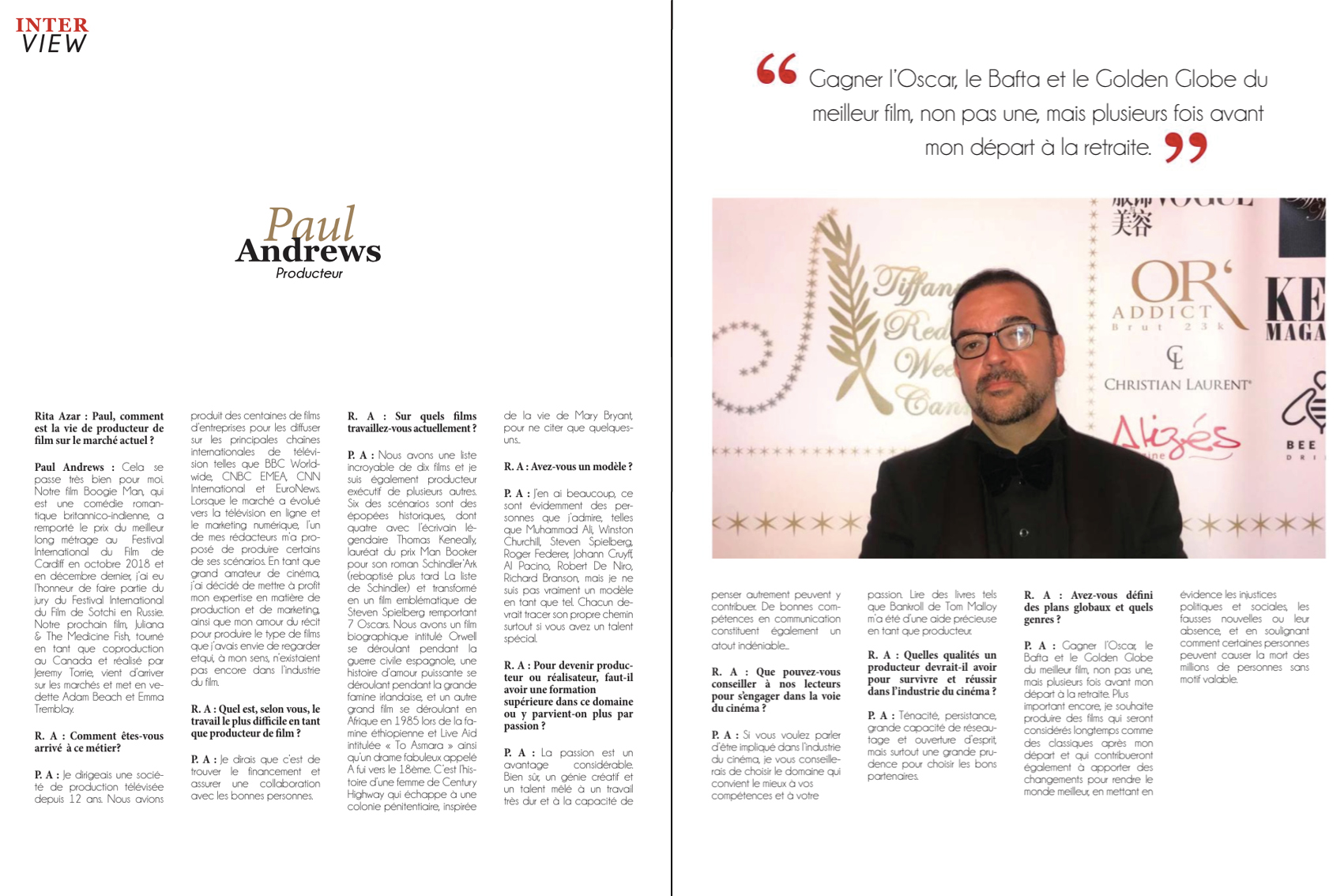Paul G. Andrews, producer and CEO at GlobalWatch Films, was interview by Rita Azar for People Alizés Magazine in 2017 at the Cannes Film Festival.
In the interview Paul discusses his latest projects, his future plans, and gives some tips to aspiring filmmakers.
Check out the interview below: (for English translation see below article)

Rita Azar: Paul, what is the life of a film producer like in the current market?
Paul Andrews: It’s going very well for me. Our film Boogie Man, which is a British-Indian romantic comedy, won the Best Feature Film award at the Cardiff International Film Festival in October 2018 and last December I had the honour of being part of the Jury at the Sochi International Film Festival in Russia.
Our next film, Juliana & the Medicine Fish, a Canadian co-production directed by Jeremy Torrie, is being taken to market and stars Adam Beach and Emma Tremblay.
R.A: How did you get to this job?
P.A.: I ran a television production company for 12 years. We produced hundreds of corporate films that we broadcast on major international television channels such as BBC Worldwide, CNBC, EMEA, CNN International and EuroNews. As the market evolved towards online television and digital marketing, one of my editors proposed to me to produce some of his ideas. As a great film lover, I decided to use my expertise in production and marketing as well as my love of storytelling to produce the type of films that I wanted to watch and which, in my opinion, did not yet exist in the film industry.
R.A.: What do you think is the most difficult job as a film producer?
P.A.: I would say finding financing and ensuring we are working with the right people.
R.A.: What films are you currently working on?
P.A.: We have an incredible slate of 10 films, and I am the executive producer of several others. Six of the stories are historical epics, of which four are with legendary writer Thomas Keneally, winner of the Man Booker Prize for his novel Schindler’s Ark (later renamed Schindler’s List) and made into Steven Spielberg’s iconic film winning 7 Oscars. We have a biographical film called Orwell which takes place during the Spanish Civil War, a powerful love story set during the Great Irish Famine, and another epic film set in Africa in 1985 during the Ethiopian Famine and Live Aid called ‘To Asmara’, as well as the fabulous drama Fled which is set in the 18th century. It is the story of a highway woman who escapes a penal colony, inspired by the life of Mary Bryant, to name a few.
R.A.: Do you have a role model?
P.A.: I have a lot, they are obviously people I admire such as Muhammed Ali, Winston Churchill, Steven Spielberg, Roger Federer, Johann Cruyff, Al Pacino, Robert De Niro, Richard Branson, but I am not really a role model as such. Everyone should chart their own path, especially if you have a special talent.
R.A.: To become a producer or director, do you have to have some education in this area, or do you do it more out of passion?
P.A.: Passion is a considerable advantage. Of course, creative genius and a talent for very hard work and the ability to think outside the box can help. Good communication skills are also an undeniable asset…
R.A.: What can you advise our readers who want to get involved in cinema?
P.A.: If you want to talk about being involved in the film industry, I would advise you to choose the field that best suits your skills and passion. Read the book Bankroll by Tom Malloy, it was a huge help to me as a producer.
R.A: What qualities should a producer have in order to survive and succeed in the film industry?
P.A.: Tenacity, persistence, great networking capacity and open-mindedness, but above all great caution in choosing the right partners.
R.A.: Have you got any global plans and if so, what are they?
P.A.: Win the Oscar, the Bafta and the Golden Globe for Best Film, not once, but several times before I retire. More importantly, I want to produce films that will long be considered classics after my departure and which will also help bring about change to make the world a better place, by highlighting political and social injustices, fake news or its lack thereof, and highlighting how some people can cause millions of people to die without cause.
